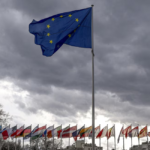Europe Day today is celebrated just before the European elections that take place in early June. Deutsche Welle shows in which areas the European Parliament has left its mark in recent years, and in which it has not.
First the departure of Great Britain from the EU, then the Pandemic of COVID-19, then Russia’s war in Ukraine, – since the last European elections held in 2019, the European parliamentarians have faced great challenges. Therefore, one easily forgets what the topics of the agenda were.
Green Deal: How are things with climate promises?
In 2019, the European Commission, the EU’s executive body, presented a plan to reduce carbon dioxide emissions in the EU by 55 percent by 2030 from 1990 levels, and by 2050 to achieve neutrality of emissions. In this way, it was reacted to the pressure exerted by young activists who came out to protest in the streets in many countries, in the so-called “green wave”. During the elections of the first five years, many green MPs took seats in the European Parliament, as never before.
Since that time, the EU Parliament has participated in the negotiations for the compilation of several laws, through which it is thought to keep the promises to fulfill the Green Pacts, Green Deals. These include, for example, plans to ban the production of internal combustion engine cars for the next decade and impose taxes on certain imported products bearing the stamp of high carbon dioxide production, so that those who pollute the environment forced to pay.
“The European Parliament has proven itself to be an experienced legislator in environmental policy issues,” says Peggy Corlin, head of the Brussels office of the Robert-Schuman Foundation Institute.
During these days, polls have shown that the trend goes against the Greens. Due to protests across the EU, Brussels liberalized some rules for the ecological economy, in order to make it easier for farmers.
And in February, laws with the help of which the destroyed nature should be returned to a good, ecological state, barely managed to get approval in the final vote. The largest centre-right faction withdrew its support for the law because it had reservations about food safety. As part of the negotiations, the text of the law was softened considerably.
Climate advocates criticized both versions as watering down previously made climate pledges.
The EU issued the world’s first laws on artificial intelligence and Big Tech.
Since 2019, the EU has issued a series of laws to curb the power of big tech companies. Last year, a new regulation came into force, forcing online platforms to actively combat harmful content.
The EU launched new digital powers several times and controlled social networks. So with the pressure exerted by the EU, parts of the TikTokLite app that dealt with a controversial reward system were banned.
Andrea Renda, research director at the Brussels-based Center for European Policy Studies, told Deutsche Wellen that EU MPs participated “significantly” in tightening the first laws to regulate Artificial Intelligence. However, Renda warned, the EU faces a “big enforcement problem” because each rule is equipped with different enforcement processes.
Migration in the EU: despite achievements, objections continue
For a long time it continues to be one of the most controversial topics: migration and EU asylum policy. After decades of discussions, at the beginning of April, the EU Parliament gave its final approval to the asylum reform. Many national governments hailed this as a success story.
Under the new laws, each EU country must accept a certain number of migrants arriving on EU shores, or must pay compensation to other countries that receive migrants. In order to speed up deportations, asylum seekers will also be assessed according to the probability of acceptance of the asylum request. Human rights organizations criticize this new law.
“From the point of view of the legislator and considering the whole process, the result can be seen as a success,” says Helena Hahn, migration analyst at the European Policy Center institute, based in Brussels. But, says Hahn, the result also disappointed many governments.
“The reason why the deputies said Yes in the end, is the judgment that it is better with a pact, whatever it is, than without a pact at all. If the reforms had not been approved, then surely there would have been a slap in the election,” she explains. “The parties of the center and the left spectrum did not want to face these consequences.”
Nosing from abroad: Spies in the house of European democracy?
The shadows of a series of alleged snooping scandals by non-European powers still hang over Parliament. In 2022, Belgian prosecutors conducted an investigation into a scheme to influence MPs that is believed to have been made in exchange for payments. The case became known as “Qatargate”, although Qatar denied any involvement.
In April of this year, reports emerged one after another of an alleged Russian propaganda operation, and earlier this week an employee of a German EU MP was arrested on charges of spying for China. “I wonder what will happen next,” Gabriele Bischoff, a German Social Democrat member of the European Parliament, told Deutsche Wellen. “It is really important that we make our democracy resistant to foreign influence.” Last year the European Parliament strengthened whistleblower protection and toughened transparency rules for MPs.
EU policy: Support for Ukraine, condemnation of Russia
The European Parliament cannot establish laws on its own. He is obliged to discuss his proposals with the European Commission and EU member states. Therefore, his Chamber often plays with the “weak power”, and issues resolutions that are not legally binding, in order to increase the influence on the other EU institutions.
Center MEP Billy Kelleher from Ireland says that parliamentarians exerted this kind of influence in the framework of the Russian war in Ukraine. They forced governments to reduce dependence on Russian gas and strengthen support for Ukraine.
“Parliament was with the others from the beginning when, with an expanded list of sanctions against Russia, they forced a reduction in its ability to finance the war in Ukraine,” Kelleher tells Deutsche Wellen. He is one of the many MPs who have visited Ukraine since February 2022.
Otherwise, Parliament has little power directly in foreign policy, because decisions are made by EU governments. Deputies demand more and more influence. With the argument that they are ultimately elected directly by EU citizens to be members of Parliament.
But this is not a priority for all EU politicians. “We must respect the decisions of national governments, because they are the true representatives of the people,” says MEP Nicola Procaccini, head of the right-wing nationalist ECR faction.
Like the parties of the center-right spectrum to the far-right, Procaccinis’ party can also receive votes from the center and the left in the EU elections this June.







